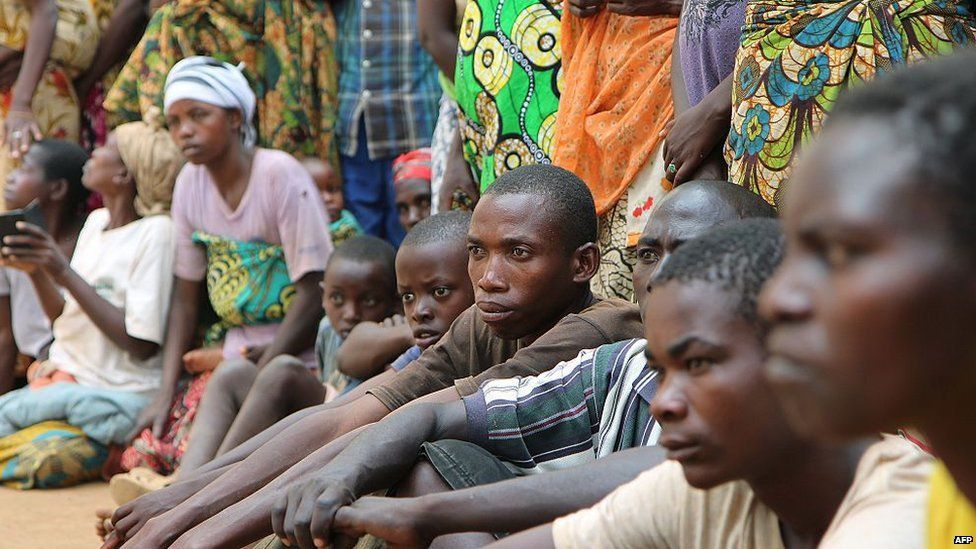Rwanda seeks to expel Burundian refugees
- Published

Rwanda says it plans to relocate Burundian refugees to other host countries, days after being accused of attempts to destabilise its neighbour.
Plans for the relocation of an estimated 70,000 refugees will start immediately, the government says.
Rwanda has been accused of arming and training refugees to fight Burundi's government, charges it denies.
Burundi has been hit by unrest since President Pierre Nkurunziza decided to stand for a third term last April.
It is not clear to which countries the refugees will be relocated.
The UN refugee agency (UNHCR) says it has received assurances from the Rwandan government that it would not "forcibly expel Burundian refugees".
It said it was concerned by the statement and urged Rwanda to state the same assurances publicly to avoid panic among refugees in Rwanda.
More than 400 people have died since the violence started in April and at least 240,000 have fled the country.
'Growing risks'
"The long-term presence of refugees so close to their country of origin carries considerable risks for all involved," the Rwandan government said in a statement explaining the move.
"The growing risks to our national security from the Burundian impasse and misunderstandings in our foreign relations are unacceptable," Foreign Minister Louise Mushikiwabo added.
The government position appears to have shifted since two days ago, when Ms Mushikiwabo was reported as saying: "We are not going to kick out Burundians fleeing the country because they are not friends with their government."
In a hearing in the US Senate Foreign Relations Committee earlier this week, two top diplomats cited reports from colleagues in the field that they said pointed to Rwandan involvement in the Burundi crisis.
Thomas Perriello, US envoy for the Great Lakes region of Africa, said the reports suggested that Burundian refugees, including children, were being recruited from camps in Rwanda to participate in armed attacks against the Burundian government.
Last week, a UN panel reported that Burundian refugees had been recruited at a refugee camp in eastern Rwanda in May and June 2015, and given two months of military training.
Rwanda has denied the allegations, calling them childish and a diversion from the real problems in Burundi.
An attempt last May by Burundian army officers launch to oust President Pierre Nkurunziza failed.
How Burundi and Rwanda fell out
- Burundi and Rwanda share a similar ethnic make-up - and both have experienced ethnic conflict. Their current presidents were on good terms until fairly recently
- November 2012: Burundian leader Pierre Nkurunziza opposes M23 rebel group based in the eastern Democratic Republic of Congo, which UN says had Rwandan government support
- May 2015: Rwandan President Paul Kagame criticises Pierre Nkurunziza's decision to run for a third term, describing it as "a serious problem"
- September 2015: Rwanda accuses Burundi of harbouring rebels from the Democratic Forces for the Liberation of Rwanda (FDLR) group, linked to the 1994 genocide
- October 2015: Burundi accuses Rwanda of training rebels, hosting the leader of a May's attempted coup and expels a veteran Rwandan diplomat.
- Published1 February 2016
- Published3 November 2015
- Published2 December 2015
- Published13 August 2012
- Published31 July 2023
- Published14 October 2015